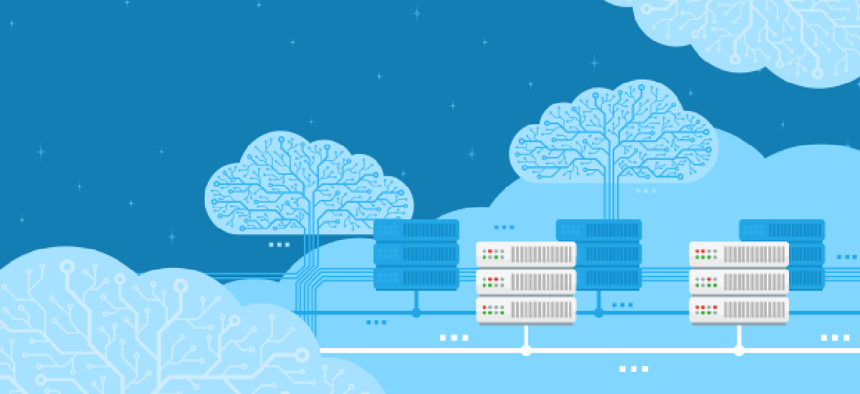Connecting state and local government leaders
Blending an interconnection-first approach with a cloud-first strategy enables digital users to gain access to multiple clouds from any location or any device.
Traditional IT infrastructures were built for a different time, and conflict with many of the core requirements of modern day computing that is exponentially increasing the world’s connectivity expectations and requirements. Today’s government must find a path that leverages disruptive technologies, such as cloud computing, without disturbing agency personnel's ability to deliver on their core missions.
As agencies try to escape the legacy systems built decades ago, benefits such as cost and energy savings are compelling them to move to cloud environments. In 2011, the White House rolled out the “Federal Cloud Computing Strategy” was rolled out to address the fact that it can take years to build new data centers for new digital services, or months to increase capacity of existing data center services. The “start-small” approach enabled by cloud computing lets agencies provision capacity incrementally so they can develop and test applications with smaller initial investments than traditional IT models allow. At the same time, the nature of some expenses change from being capital investments in hardware and infrastructure to a pay-as-you go model, making the cloud was very appealing.
However, a 2014 assessment by the Government Accountability Office revealed that government cloud adoption is lagging often because existing legacy systems are not due to be modernized or replaced. This, coupled with other challenges -- such as the decentralized structure of technology investments, lengthy procurement processes, complexities in identifying and then managing an appropriate migration path to the cloud, data governance/control issues, lack of insight into vendor technologies and capabilities and concern about vendor lock-in -- has severely impacted the success of cloud adoption.
However, understanding how an agency fits into the use cases for government is the first step in justifying the switch to the cloud. Other reasons include capabilities for the following:
Data analytics on demand. By integrating on-premises computers with pay-per-use cloud computing resources in a seamless user experience, government big data analysts working with massive datasets can shave wait times down to a fraction of an hour.
Distributing applications to users. With smaller footprints in more geographically dispersed collection points connected to the cloud for computing power, agencies can decrease latency, improve reliability and reduce network costs.
Internet of things. By integrating existing systems with various cloud platforms that can seamlessly share data, agencies can provide new digital products and services to demonstrate rapid innovation.
Disaster recovery and continuity of operations. Unplanned outages occur for reasons as routine as human error or hardware failure, and as extreme as natural disasters or acts of terrorism. Simple and cost-effective geographic distribution of disaster recovery sites or mix-and-match cloud services give agencies the redundancy and resiliency they need to still deliver, even in the event of a disaster.
Multicloud flexibility. A multicloud environment introduces the ability to seamlessly use compute power from multiple cloud providers or to easily migrate data from one cloud to another.
The interconnected cloud ecosystem
As government is pushed to think digitally, hybrid and multicloud environments are being seen as the logical next step in the value chain since integrating users, services, capacity and connectivity creates a much better user experience. Connectivity across clouds could be the most important feature of all, as standalone cloud environments can be as isolating as traditional IT infrastructure.
Some agencies have turned to the public internet to connect to clouds only to find that security and performance issues in using the public internet introduce more hurdles. Others have explored establishing dedicated links (via multiprotocol label switching extensions) from their network to each chosen cloud provider. However, this approach is expensive, requires more connections, takes months to provision and leads to vendor lock-in.
To achieve the promise of digital transformation, an interconnected government must use a new strategy to directly and securely connect people, locations, clouds and data. Integrating an interconnection-first approach with a cloud-first strategy enables digital users to gain access to multiple clouds from any location or any device. This paradigm accelerates a new level of interconnection to the multicloud environment and gives users the following benefits:
- A secure, single point of interconnection to multiple cloud providers.
- Extension of the network edge by bypassing the public internet.
- Greater security and compliance with country-based data sovereignty regulations.
- Optimized network security services.
- Low-cost, fast access.
- On-demand scalability.
Government cloud pioneers are demonstrating real and significant cost savings. They are getting unprecedented abilities to scale up and down quickly, are not being locked in and even get enhanced levels of security. Although each agency has a unique mission, security requirements and IT landscapes, the benefits of an interconnected government address every possible scenario.
An interconnected cloud ecosystem creates a high-speed fabric of globally distributed cloud-based points of presence, expanded out to the digital edge. Just as the General Services Administration's Data Center Shared Services Marketplace is envisioned to be “the central location where agencies can choose from an inventory of data center services, automated management tools and products to achieve efficiency and cost savings,” an interconnected cloud ecosystem offers a neutral marketplace for providers and consumers to come together.
The government cloud marketplace is maturing, and agencies are becoming both providers and consumers of cloud services. This opens up new avenues for shared services. In order to fulfill the potential for an interconnected government, this “platform layer” of digital services requires participation by the broadest ecosystem of network and service providers so agencies can take advantage of all that digital transformation can offer.
NEXT STORY: Using Special Nails to Save Roofs—And Dollars



